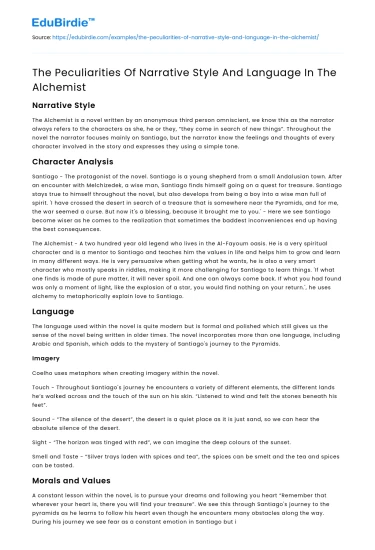Narrative Style
The Alchemist is a novel written by an anonymous third person omniscient, we know this as the narrator always refers to the characters as she, he or they, “they come in search of new things”. Throughout the novel the narrator focuses mainly on Santiago, but the narrator know the feelings and thoughts of every character involved in the story and expresses they using a simple tone.
Character Analysis
Santiago - The protagonist of the novel. Santiago is a young shepherd from a small Andalusian town. After an encounter with Melchizedek, a wise man, Santiago finds himself going on a quest for treasure. Santiago stays true to himself throughout the novel, but also develops from being a boy into a wise man full of spirit. 'I have crossed the desert in search of a treasure that is somewhere near the Pyramids, and for me, the war seemed a curse. But now it's a blessing, because it brought me to you.' - Here we see Santiago become wiser as he comes to the realization that sometimes the baddest inconveniences end up having the best consequences.
Save your time!
We can take care of your essay
- Proper editing and formatting
- Free revision, title page, and bibliography
- Flexible prices and money-back guarantee
The Alchemist - A two hundred year old legend who lives in the Al-Fayoum oasis. He is a very spiritual character and is a mentor to Santiago and teaches him the values in life and helps him to grow and learn in many different ways. He is very persuasive when getting what he wants, he is also a very smart character who mostly speaks in riddles, making it more challenging for Santiago to learn things. 'If what one finds is made of pure matter, it will never spoil. And one can always come back. If what you had found was only a moment of light, like the explosion of a star, you would find nothing on your return.', he uses alchemy to metaphorically explain love to Santiago.
Language
The language used within the novel is quite modern but is formal and polished which still gives us the sense of the novel being written in older times. The novel incorporates more than one language, including Arabic and Spanish, which adds to the mystery of Santiago's journey to the Pyramids.
Imagery
Coelho uses metaphors when creating imagery within the novel.
Touch - Throughout Santiago's journey he encounters a variety of different elements, the different lands he’s walked across and the touch of the sun on his skin. “Listened to wind and felt the stones beneath his feet”.
Sound - “The silence of the desert”, the desert is a quiet place as it is just sand, so we can hear the absolute silence of the desert.
Sight - “The horizon was tinged with red”, we can imagine the deep colours of the sunset.
Smell and Taste - “Silver trays laden with spices and tea”, the spices can be smelt and the tea and spices can be tasted.
Morals and Values
A constant lesson within the novel, is to pursue your dreams and following you heart “Remember that wherever your heart is, there you will find your treasure”. We see this through Santiago's journey to the pyramids as he learns to follow his heart even though he encounters many obstacles along the way. During his journey we see fear as a constant emotion in Santiago but in different forms, like fear of dying or the spiritual fear of him failing to turn into the wind when The Alchemist asks him to try.
The novel teaches us the value of nature and how it teaches us many things, like Santiago is tested through nature whilst journeying towards the pyramids. “And when you want something, all the universe conspires in helping you to achieve it”. The novel also teaches us the moral of love and we see it through Santiago when he discovers his love for Fatmia, and according to The Alchemist, without love our lives are incomplete.
Setting
The novel is set in the Spanish town of Tarifa and takes us through a journey to North Africa, Egypt and the Sahara desert. The novel is set in the past before most modern technology existed, so is clearly pre-modern. We see me still fighting “... with swords..” so it gives us a clear time view as today weaponary is more advanced.
I liked the adventure in the novel, as Coelho makes is feel quite realistic to where it felt like I was going along the journey with Santiago. The older and different languages used also made it very interesting, Another aspect I liked was the different life lessons it taught me. “Courage is the quality most essential to understanding the Language of the World” is one quote that stood out to me in the novel. There aren't any aspects I disliked about the book.






 Stuck on your essay?
Stuck on your essay?

